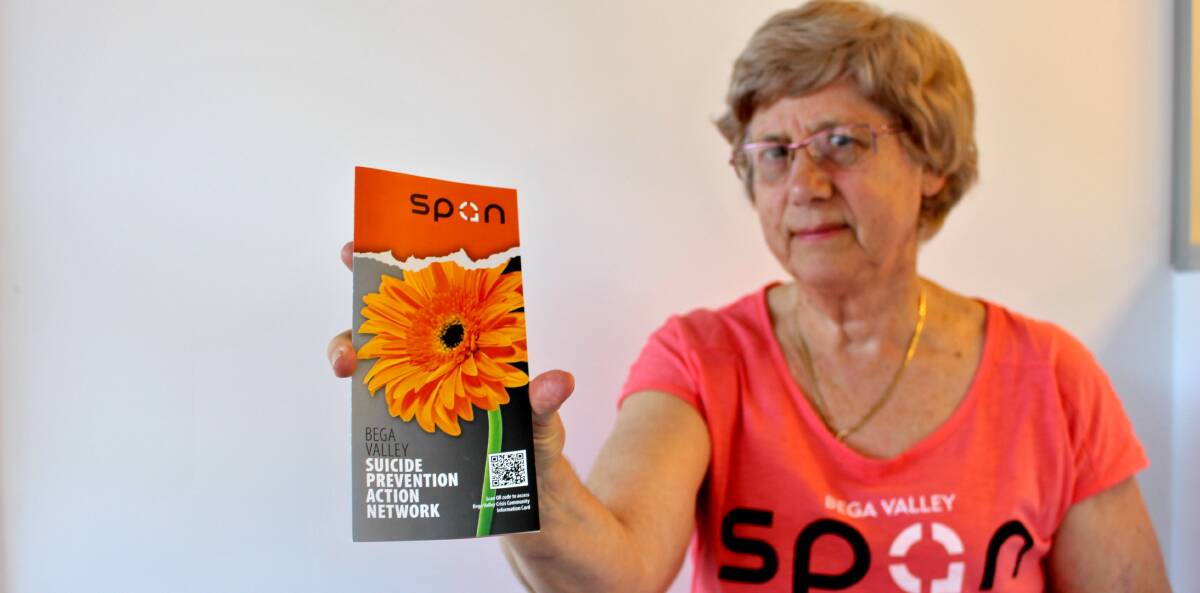
Six years ago today Helen Best’s only son took his own life.
Subscribe now for unlimited access.
$0/
(min cost $0)
or signup to continue reading
It’s a moment she will never forget and will never get over.
“I felt like Humpty Dumpty who fell off the wall. I began to seriously doubt that I, or anybody else, could put the shattered pieces of me back together again,” Ms Best said.
But now, after years of pain and suffering Ms Best is speaking out in an effort to prevent others from going through what she and her son went through.
She is one of the many health professionals and volunteers in the community that have come forward after it was discovered that four local people had taken their own life, in the last two weeks.
In the months and years after her son’s death, Ms Best felt herself spiraling into depression and having suicidal thoughts.
“Everyone else appeared to be getting on with their life, but I seemed to be drifting further away from my former life, losing hope, feeling great fear and increasing anxiety.”
Despite support and encouragement from her family and friends, Ms Best was not coping and it wasn’t until she started professional counselling that her life started to turn around.
“To lose someone we love to suicide is devastating. When that person is your child, who we take for granted will outlive us, we enter yet another dimension of seemingly intolerable grief.”
Ms Best said she wants to break the taboo on suicide and on seeking professional help.
“People often think that they should be able to get by and not need counselling, even for traumatic loss. The shame factor is huge here, people feel ashamed that they need help.”
Time, professional help and support from those around her helped to heal Ms Best’s wounds and while the pain is still there, she has been able to find peace and joy again.
”When in the worst of my confusion and grief, I made a commitment to myself that, if I could get through this, I would make more information available to help others who have been bereaved by suicide,” she said.
“As I have gained more optimism and confidence I have also allowed myself to dream of a world without suicide.”
As secretary for the Bega Valley Suicide Prevention Action Network, Ms Best is now working towards educating the local community to help people find out how to recognise and assist people at risk or bereaved by suicide.
“One suicide is too many, but to have four seemingly unrelated suicides is just devastating,” she said.
Merimbula clinical psychologist, Susanna Genot said the suicide rate in the Merimbula community was “way out of proportion”.
“I think our area has higher than usual numbers of suicides,” Ms Genot said.
It is not only a local issue. A steep rise in death by suicide among middle-aged Australians and young women has driven the national suicide rate to its highest level in 13 years.
Australia's suicide rate rose to 12 per 100,000 people in 2014, according to Bureau of Statistics figures released in March – the highest level since 2001, when it reached 12.6 per 100,000.
Ms Genot said it’s time for the Merimbula community to do something about this and to think about asking the hard question.
“People worry about mentioning suicide. Don’t be afraid to ask whether they have thought about suicide. Sometimes it can be a relief for someone to be able to talk about it. If they say yes, listen and encourage them to seek professional advice,” she said.
Bega Valley deputy mayor, Liz Seckold and chairwoman of SPAN agreed that it was time for the community to take action and stand against suicide.
“We can’t ignore this any longer, we need to get rid of the stigma associated with suicide and mental health issues and we need to make sure everyone feels comfortable in our community so they don’t resort to drastic measures,” Ms Seckold said.
Ms Seckold and Ms Best have stepped up their efforts with SPAN in recent months to bring about more integrated services so people do not fall through the cracks.
They have developed crisis cards to hand out and are offering their services and giving presentations to local businesses, schools and community groups.
“We may not be able to always control what happens around us but we do have choice about how we respond. We can try to live behind a social mask, stay shattered inside, push it all aside and hope it will get better. Or we can acknowledge if we are out of our depth. We can seek help and choose life,” Ms Best said.
If this has raised concerns for you, contact one of the following organisations:
- Lifeline: 13 11 14, www.lifeline.org.au
- Suicide Call Back Service: 1300 659 467, www.suicidecallbackservice.org.au
- beyondblue: 1300 22 4636, www.beyondblue.org.au
RELATED ARTICLES:

